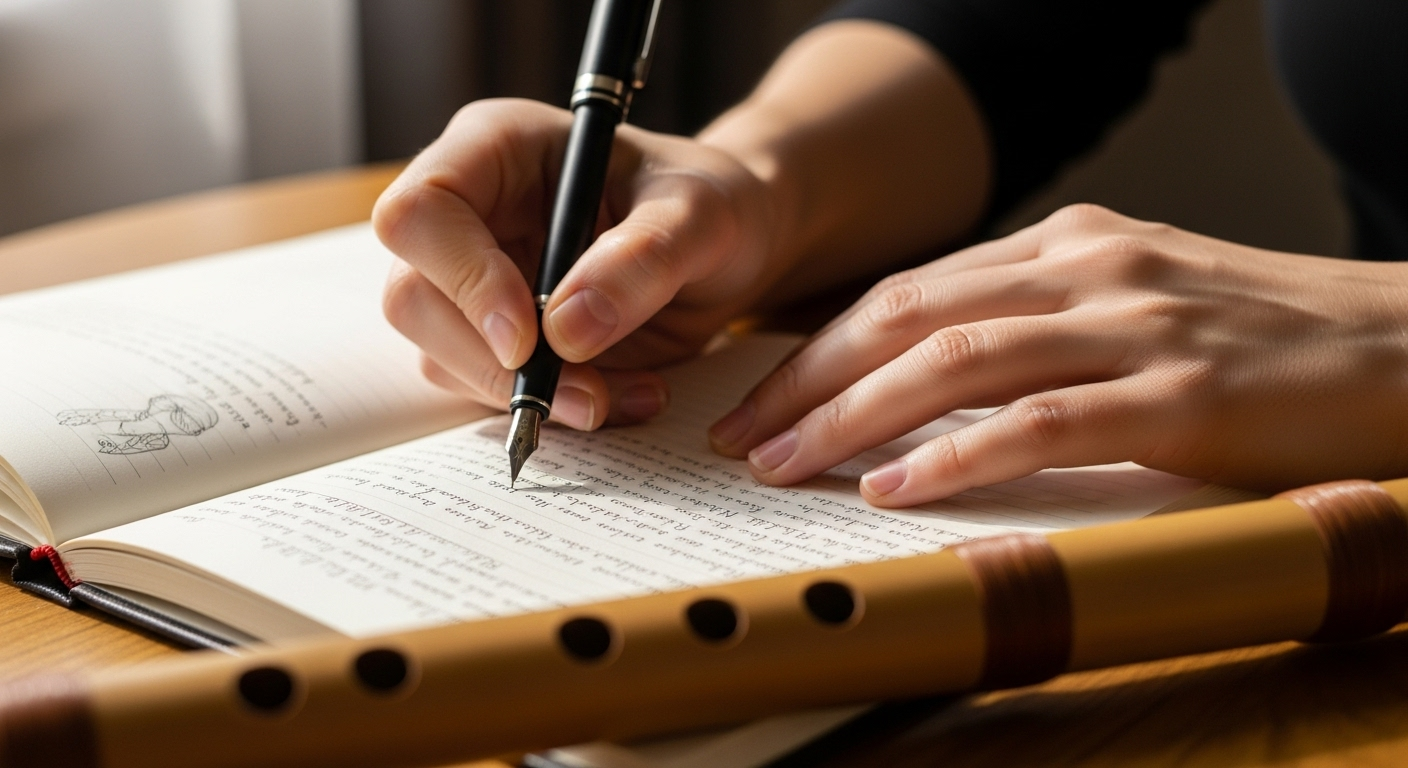Introduction
Emotional intelligence is one of the most important skills for managing daily life, work challenges, and personal relationships. From my own experience, I often struggled with emotional regulation, particularly during stressful workdays and tight project deadlines.
I noticed that small setbacks would trigger disproportionate frustration, and decision-making under pressure became challenging. Applying emotional intelligence principles transformed my approach, allowing me to respond thoughtfully rather than react impulsively. One practice that particularly helped was bamboo flute meditation.
Spending 10–15 minutes listening to soothing flute music while reflecting on my feelings created a calming environment that enhanced self-awareness and improved focus. Over time, I realized that emotional intelligence is not only about controlling emotions but also understanding them deeply, responding appropriately, and maintaining strong social connections.
By integrating structured exercises and meditation routines, I gradually experienced better stress management, improved relationships, and increased confidence in my decision-making. In this article, I will share practical tips, exercises, common mistakes to avoid, and long-term benefits, including personal insights and examples from bamboo flute meditation.
Why Emotional Intelligence Matters
Emotional intelligence, often abbreviated as EQ, plays a crucial role in daily life. High EQ allows individuals to recognize and manage their own emotions, empathize with others, and maintain harmonious relationships. At work, I found that practicing emotional intelligence reduced conflicts and improved collaboration with colleagues. In social situations, understanding others’ feelings helped me respond with empathy rather than frustration. For example, during a project review, I remained calm even when feedback was unexpectedly critical. Instead of reacting defensively, I reflected on the feedback, identified areas for improvement, and responded constructively.
Research shows that individuals with higher EQ experience lower stress levels and better psychological health. By developing self-awareness, one can recognize emotional triggers early and apply coping strategies before stress escalates. Bamboo flute meditation complements this process by promoting relaxation and helping the mind focus. Listening to calming flute music for 10 minutes in the morning allowed me to start the day with clarity and reduced emotional reactivity. Over time, the consistent practice created a ripple effect, improving patience, resilience, and interpersonal interactions.
Emotional intelligence also aids decision-making. During periods of high workload, I noticed that I made better choices when I first acknowledged my emotional state, paused to reflect, and engaged in a short meditation. The connection between emotional awareness and cognitive function cannot be overstated. Through daily practice, one develops the capacity to respond thoughtfully, adapt to unexpected challenges, and maintain steady performance even under pressure.
How to Improve Your Emotional Intelligence
Self-awareness is the foundation of emotional intelligence. One simple exercise I used involved taking five minutes each morning to check in with my emotions. I would ask: “How am I feeling right now? What might be causing these emotions?” Writing down the responses created a mental map of triggers and patterns. Bamboo flute meditation enhanced this practice by providing a calming auditory backdrop, allowing deeper introspection.
Empathy is another key component. To improve empathy, I practiced imagining myself in another person’s situation. For example, when a colleague appeared frustrated, instead of assuming negative intent, I considered the pressures they might be experiencing. By combining this reflection with listening to soothing flute music, I cultivated patience and compassion, which strengthened professional and personal relationships.
Self-regulation can be enhanced through structured breathing exercises. In moments of frustration, I took slow, deep breaths while listening to flute tracks, allowing me to calm my nervous system before responding. This technique prevented impulsive reactions and encouraged thoughtful communication. Over weeks of consistent practice, I observed a measurable decrease in workplace tension and improved collaboration outcomes.
Social skills can also be developed through regular reflection and practice. Engaging in brief check-ins with friends or colleagues and consciously applying empathetic responses improved connection and trust. Bamboo flute meditation sessions often acted as preparation for these interactions, centering my mind and enhancing emotional readiness.
Common Mistakes to Avoid
Ignoring emotions is a frequent error. Suppressing frustration or sadness can intensify stress over time. Instead, acknowledge and validate your feelings, perhaps by journaling or during a meditation session.
Confusing empathy with agreement is another common mistake. While empathy involves understanding others’ perspectives, it does not require endorsing all behaviors. Practicing discernment ensures healthy boundaries.
Neglecting self-care also undermines emotional intelligence. Skipping breaks, foregoing meditation, or overloading tasks reduces the ability to respond effectively. I personally scheduled daily bamboo flute meditation sessions and short mindfulness pauses to maintain equilibrium.
Overgeneralizing emotional patterns is another trap. Assuming that a single experience represents all future interactions can lead to unnecessary anxiety. Keeping a balanced perspective through reflection and meditation helps counteract this tendency.
Finally, neglecting consistent practice is detrimental. Emotional intelligence grows gradually. Sporadic exercises yield limited benefits. Daily routines, such as journaling, empathy exercises, and flute meditation, produce the most substantial improvements over time.
Daily Exercises for Emotional Growth
Morning check-ins with a journal allow for early recognition of emotional patterns. Start with five minutes to note feelings and triggers, paired with 10 minutes of bamboo flute meditation.
Empathy walks are another useful exercise. While walking outside, consider interactions from other people’s perspectives. Incorporating natural sounds or flute background music strengthens focus and reflection.
Role-playing potential conflict scenarios helps anticipate responses and refine emotional regulation strategies. Engage with a friend or record yourself to evaluate reactions objectively.
End-of-day reflections consolidate lessons. Review journal entries and meditation experiences, noting progress and areas for improvement. This reinforces emotional awareness and prepares you for future challenges.
Tips to Maintain Emotional Intelligence
Maintain consistent routines. Morning and evening meditation sessions, coupled with journaling, solidify emotional awareness.
Integrate supportive tools. Using apps or online platforms for mood tracking and guided flute meditation sessions enhances consistency.
Adjust your environment. Minimize distractions during meditation and reflection periods to maximize focus and effectiveness.
Engage socially with intention. Practice empathetic listening and clear communication in both personal and professional interactions.
Seek continual learning. Attend workshops, read books, or watch videos on emotional intelligence to deepen understanding and discover new techniques.
Long-Term Benefits of Emotional Intelligence
Developing emotional intelligence leads to sustained stress reduction. Daily reflection and meditation create habits that prevent emotional overload.
Improved relationships result from better empathy and communication. Personally, I observed strengthened professional connections and deeper personal bonds.
Career growth is facilitated by better decision-making, conflict resolution, and leadership skills. Employers and clients respond positively to emotionally competent individuals.
Mental resilience increases. Emotional intelligence enables one to adapt to challenges with composure, turning setbacks into learning opportunities.
Bamboo flute meditation enhances all of these benefits by providing a consistent calming ritual that strengthens self-awareness, focus, and emotional regulation. Over months of practice, I experienced not only reduced anxiety but also increased creativity, motivation, and overall satisfaction in daily life.
Your Experience
I encourage you to explore emotional intelligence through small, daily exercises. Which meditation routines work best for you? How do you practice empathy in real-life scenarios? Consider experimenting with bamboo flute meditation as a tool to support reflection and emotional growth. Sharing your experiences can provide insight and encouragement to others seeking emotional balance.
Internal Link: → Morning Meditation
External Link: → Soojz| The Mind Studio






